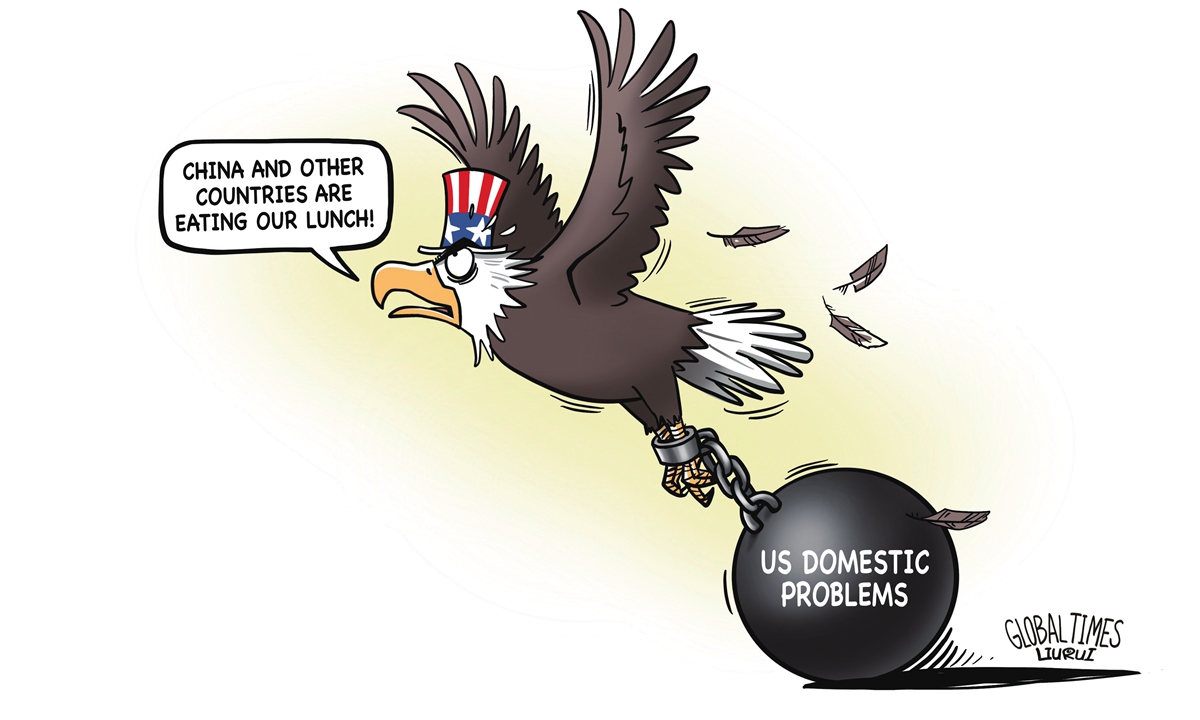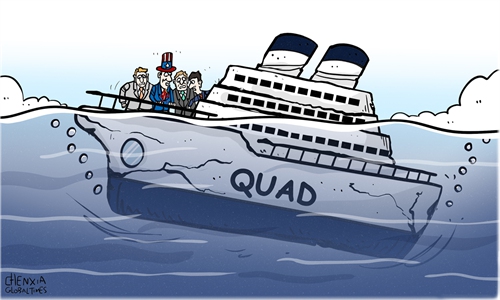
Illustration: Liu Rui/GT
In his latest book, The Asian 21st Century, Kishore Mahbubani, a scholar and former diplomat from Singapore, claims that although globalization began in the West, it is in the West that the voices warning of its impending destruction are most audible. He contends that in managing globalization, the West, or more specifically the US, has made three strategic mistakes. The first is the failure of the elites in the US to protect the working classes from the inevitable disruptions caused by globalization. The second is the weakening of government institutions, especially in the US. Finally, the creation of a functional plutocracy has effectively undermined the American democratic system.The focus of Mahbubani's viewpoint above is on the problems with the system of power distribution inside the US. It partially explains why the US is opposed to globalization. Nonetheless, they are not the fundamental reasons.
The strategic mistakes of the US in the process of globalization can be summarized in three larger areas. One is liberalism's utter dominance in the intellectual sector. They champion economic laissez-faire and the freedom of individuals against the excessive power of government. Second, the "industrial hollowing out" in the policy field. The US government actively expanded the financial sector during the 1980s and 1990s while also gradually easing regulations. At the same time, the US further accelerated industrial upgrading, with the information industry-based high-tech service industry established as the focus of development, resulting in the US' "industrial hollowing-out." Third, there is a power imbalance in the institutional field, which relates to the three strategic mistakes Mahbubani summarized.
The different US administrations approached the issue of what has caused the US to suffer in the process of globalization differently. The Trump administration has blamed previous US administrations for the problems the US faces with globalization. In his 2015 book Crippled America: How to Make America Great Again, Trump referred to China as an "enemy" to American imports. Trump, who then became the US president, said during his appearance at the APEC CEO Summit in 2017 that "the current trade imbalance is not acceptable. I do not blame China or any other country. I wish previous administrations in my country had seen what was happening and done something about it. They did not, but I will." The Biden administration has blamed China and other countries for the unemployment of American workers. In March 2021, speaking on the American Jobs Plan, Biden warned that China will "eat our lunch" if America doesn't step up its infrastructure spending.
The US government has taken a number of countermeasures. For one thing, the US has tried to promote "re-industrialization." For example, the Obama administration launched "the United States Manufacturing Enhancement Act of 2010" and the "National Export Initiative." Biden signed the Inflation Reduction Act, which calls for the establishment of long-term resilience in the supply chain and the expansion of access to capital for small manufacturers. For another, the US is trying to build a new ideological foundation. On April 27, 2023, US National Security Advisor Jake Sullivan put forward a proposal for international economic policy called the "New Washington Consensus." It signals the end of the neo-liberal order, when free markets had a paramount role in an economy dominated by private-sector enterprises.
However, the US strategy was unable to resolve the issues it had with globalization. First, its "re-industrialization" measures had not substantially upgraded its manufacturing sector. Second, the "New Washington Consensus" is not beneficial in terms of trade. American scholars James C. Capretta and Stan Veuger argue that while Sullivan may be right that a political convergence is underway, all of the immense benefits from free trade would be at risk if the US, as the primary force behind it for seven decades, chose to elevate short-term political considerations instead. Finally, the US has failed to undertake institutional reforms involving the distribution of power within the country.
The root cause of the US' inability to carry out radical reforms at home lies in the philosophy and values of liberalism and the capitalist economic and political system built on them. As a result, the US is unable to substantially alter the issues it faced as a result of globalization. Furthermore, inspired by misperceived beliefs, it would deepen economic nationalism and trade protectionist policies, causing additional turmoil in the global economy and more complicated relations among the big countries. America's globalization wounds are self-inflicted.
The author is an associate research fellow with the National Institute of International Strategy at the Chinese Academy of Social Sciences. opinion@globaltimes.com.cn


